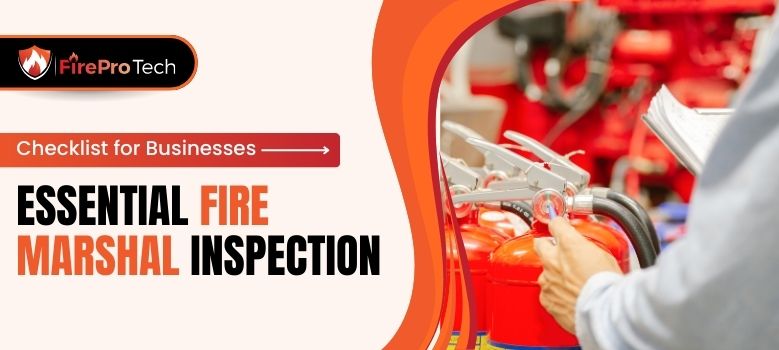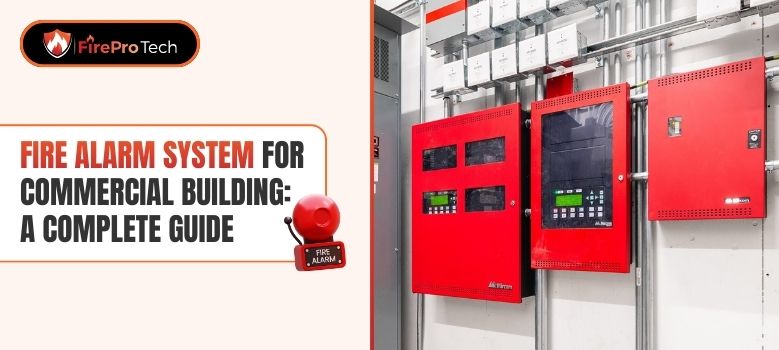
A fire marshal inspection is one of the most important safety and compliance requirements every business must face. For property managers, safety directors, and business owners, these inspections are not simply about checking boxes. They are about protecting lives, safeguarding assets, and ensuring uninterrupted operations.
Many organizations approach inspections with a sense of anxiety, unsure of what will be reviewed or how violations could impact their operations. The reality is that inspections are designed to help businesses maintain compliance with fire codes, reduce liability, and avoid preventable tragedies. By understanding how inspections work and what to expect, leaders can turn them from a stressful event into an opportunity to improve workplace safety.
At FirePro Tech, LLC, we partner with businesses to simplify this process. From preparing documentation to maintaining fire protection systems, our role is to ensure that clients approach every inspection with confidence. This guide will break down the essentials of a fire marshal inspection, explain why it matters, and highlight how organizations can prepare effectively.
A fire marshal inspection is a structured evaluation conducted by a local authority to confirm that a building complies with current fire and life safety codes. These inspections are both proactive and protective. They are proactive because they identify hazards before they escalate into emergencies, and protective because they reinforce measures that can save lives during a fire event.
One common source of confusion is the difference between a fire inspector and a fire marshal. A fire inspector is typically responsible for routine inspections, reviewing individual systems, and ensuring compliance with specific code requirements. A fire marshal, on the other hand, often holds broader authority, overseeing large-scale inspections, enforcing fire code violations, and, in some jurisdictions, issuing permits or fines.
While the roles overlap, a fire marshal inspection generally carries more weight in terms of legal responsibility and compliance. Businesses that overlook these differences may underestimate the importance of preparing properly. FirePro Tech, LLC helps bridge that gap by ensuring clients know exactly which authority is reviewing their facilities and what that inspection entails.
Get Your Fire Marshal Inspection for Business Now!
A fire marshal building inspection is not a quick walkthrough. It is a systematic evaluation of both visible conditions and behind-the-scenes systems that keep a facility safe. The fire marshal will typically examine exits, emergency lighting, alarm panels, sprinkler readiness, and the placement and tagging of extinguishers. Beyond equipment, the inspection also includes documentation such as maintenance records, occupancy permits, and proof of safety drills.
Inspectors may also verify housekeeping practices, including the storage of combustible materials and clear access to electrical panels. If deficiencies are noted, the findings are documented in a fire marshal inspection report, which outlines violations and corrective actions required. By staying proactive with inspections and service, businesses can avoid costly repeat visits or potential shutdowns.
Every fire marshal inspection is rooted in code enforcement, but the true purpose extends beyond compliance. Codes exist to reduce the likelihood of injury, property damage, and business disruption. A single oversight—such as a blocked exit or expired extinguisher—can escalate into a catastrophic event if not corrected.
From a liability standpoint, inspections protect business owners and managers. If a fire occurs and records reveal consistent failures to comply with fire marshal inspection requirements, the financial and legal consequences can be severe. Conversely, a strong inspection history demonstrates due diligence and a commitment to safety.
Finally, inspections protect business continuity. By preventing small issues from developing into major hazards, they minimize downtime and help ensure facilities remain open, safe, and compliant. FirePro Tech, LLC supports this mission by offering comprehensive fire protection services that align directly with what fire marshals look for during inspections.
A fire marshal inspection checklist covers every critical element that ensures a building is safe for occupants. It is more than a simple review—it is a comprehensive process that evaluates whether fire protection systems, exits, and safety measures are fully functional. Each category of this checklist addresses risks that, if overlooked, could put lives and property in jeopardy. Businesses that prepare thoroughly using these checkpoints position themselves for smooth inspections and long-term safety. FirePro Tech, LLC helps clients stay inspection-ready by managing every system that a fire marshal may review.
One of the first areas examined during a fire marshal inspection is the building’s exit system. Exits must be free of obstructions, properly marked, and sufficient for the building’s occupancy load.
Inspectors will verify that all exit doors open easily without keys or special tools. Pathways must remain unobstructed at all times, and emergency exit signs must be posted clearly. The posted occupant load must also match the approved number for the facility, ensuring compliance with safety codes.
Lighting systems play a crucial role during power outages or emergencies. A fire marshal inspection always includes a review of exit signs and backup lighting.
Exit signs must remain illuminated at all times, and emergency lighting must activate immediately in the event of power failure. Inspectors check battery backup systems, confirm proper lighting levels in hallways and stairwells, and review documentation of monthly functional tests. FirePro Tech, LLC offers service programs that keep these systems compliant year-round.
Fire alarm systems are central to early warning and evacuation. No fire marshal inspection is complete without confirming the alarm panel’s status and functionality.
Inspectors will review test logs to ensure the system has undergone proper annual inspections. They also check for active trouble signals on the alarm panel and confirm that audible and visual notifications reach all required areas. Missing records or faulty devices often result in violations that must be corrected quickly.
A fire marshal inspection checklist always includes fire sprinkler systems, as these are proven to control and suppress fires before they escalate.
Sprinkler heads must have at least 18 inches of clearance beneath them, and all valves must be accessible and properly labeled. Inspectors also review gauge readings and confirm that required five-year internal pipe inspections have been completed. FirePro Tech, LLC provides testing and maintenance services that keep these systems in top working order.
Every fire marshal inspection evaluates fire extinguishers for placement, accessibility, and service tags.
Extinguishers must be located within travel distance requirements, mounted at appropriate heights, and tagged with current inspection dates. Monthly visual checks should be documented to confirm that units remain pressurized and undamaged.
Many violations noted during a fire marshal inspection involve improper use of electrical systems or poor housekeeping practices.
Electrical panels must be kept clear of obstructions, with no storage allowed within the required clearance space. Extension cords cannot replace permanent wiring, and power strips must not be daisy-chained. Inspectors also verify that combustible materials are stored safely away from ignition sources.
A fire marshal inspection checklist also addresses facilities that store chemicals, flammables, or other hazardous materials.
All hazardous materials must be kept in approved storage cabinets or rooms with proper ventilation. Incompatible chemicals must be separated, and required hazard signage must be displayed. Improper storage is a common violation and often results in follow-up inspections.
Even the best systems cannot protect occupants if staff are not trained. During a fire marshal inspection, training records and drill documentation may be reviewed.
Employees must understand evacuation procedures, extinguisher use, and reporting requirements. Documentation showing completed fire drills, safety training, and inspection logs demonstrates compliance and reduces liability. FirePro Tech, LLC assists organizations in organizing and maintaining these critical records.
Read Also: A Comprehensive Guide to Houston Fire Code Compliance
Businesses often ask how to approach a fire marshal inspection with confidence, and one of the most common questions is “How Do You Pass A Fire Marshal Inspection?” The answer lies in preparation, corrective action, and clear communication. When organizations follow a structured plan, the process becomes less about fear of violations and more about showcasing a culture of safety. FirePro Tech, LLC works closely with businesses to implement the right steps before, during, and after the inspection.
The first step to success is conducting a detailed internal walkthrough. Using a fire marshal inspection checklist as a guide, management should evaluate exits, alarms, extinguishers, sprinklers, and emergency lighting. Records for maintenance and testing should be verified to ensure they are current. This proactive review helps identify small deficiencies before they become costly violations.
Any issues discovered during the walkthrough must be addressed immediately. Broken exit signs, expired extinguisher tags, or sprinkler clearance violations should be corrected without delay. Work orders should be tracked and documented, showing proof of completion. In some cases, a re-inspection by a certified fire protection provider like FirePro Tech, LLC may be necessary to confirm corrections before the official visit.
When the fire marshal arrives, staff should be prepared to escort them through the facility. Providing easy access to all areas speeds the process and demonstrates cooperation. Inspection reports, testing logs, and permits should be organized and available for review. Having these materials ready shows the business values compliance and transparency, which often sets a positive tone for the entire fire marshal inspection.
Once the inspection is complete, the business will receive a fire marshal inspection report. This document outlines violations, corrective actions, and deadlines. It is critical to review this report carefully, prioritize tasks by severity, and assign responsibilities for corrections. Addressing issues promptly not only ensures compliance but also builds a positive relationship with the authority having jurisdiction. FirePro Tech, LLC assists businesses with interpreting reports and planning corrections efficiently.
Many business owners are uncertain about how to get a fire marshal inspection scheduled, especially when opening new facilities or undergoing renovations. Understanding when inspections are triggered and what to expect allows organizations to prepare ahead of time. Scheduling properly ensures compliance without unnecessary delays.
A fire marshal inspection can occur under several circumstances. Routine inspections are scheduled by local authorities on a recurring basis, typically annually or biannually. Permit-driven inspections happen when a business applies for occupancy or construction permits. Finally, complaint-driven inspections may occur if a concern is reported to the fire department. Recognizing these triggers helps organizations avoid being caught off guard.
Businesses can request a fire marshal inspection by contacting the local fire authority. In some jurisdictions, scheduling is automatic, while in others, the business must initiate the request. Before scheduling, it is important to prepare required documents such as permits, testing records, and maintenance logs. Having these ready not only shortens the inspection but also increases the likelihood of passing without violations. FirePro Tech, LLC helps businesses compile the necessary paperwork to streamline the process.
During a fire marshal inspection, it is advisable for a facility manager or safety officer to accompany the inspector. This ensures questions can be answered immediately and issues addressed on the spot. The duration of an inspection depends on the size and complexity of the facility but typically ranges from one to several hours. If violations are found, a follow-up inspection may be scheduled to verify corrections. Businesses that maintain proper records and consistent service often find these rechecks simple and efficient.
While the principles of safety remain consistent, a fire marshal inspection can vary depending on state and county requirements. Every jurisdiction follows the core fire code, but certain regions enforce unique provisions or emphasize different priorities. Businesses must adapt their internal processes to align with these variations or risk delays and penalties. FirePro Tech, LLC assists organizations by interpreting local requirements and applying them effectively.
In Texas, inspectors focus heavily on documentation and proof of ongoing maintenance. A Texas fire marshal inspection checklist will typically require evidence of annual testing for alarms, sprinklers, extinguishers, and emergency lighting. In addition, many jurisdictions within the state place emphasis on occupant load compliance and clear emergency egress routes. Failing to produce records during the inspection is one of the most common reasons for citations.
In Harris County, inspections frequently include a closer review of permits, system tags, and updated forms. A Harris County fire marshal inspection checklist may require businesses to provide valid proof that suppression systems, extinguishers, and alarms have been tested and tagged by certified providers. Inspectors may also examine special hazard systems, such as kitchen suppression or clean agent solutions, more closely than in other regions. By maintaining partnerships with service providers like FirePro Tech, LLC, businesses can ensure every tag and form is up to date before the inspector arrives.
For companies with facilities in multiple regions, preparing for a fire marshal inspection becomes more complex. Each location may face slightly different requirements depending on the local authority. To simplify this challenge, businesses should create a standardized inspection checklist that incorporates the most stringent requirements across all regions. This approach minimizes surprises and ensures every facility remains compliant regardless of jurisdiction.
Receiving a fire marshal inspection report is not the end of the process—it is the beginning of corrective action. This report outlines violations, required changes, and deadlines for compliance. How a business responds determines whether it builds credibility with the fire marshal or faces repeat inspections and potential penalties. FirePro Tech, LLC partners with businesses to turn reports into structured action plans.
Not all violations carry the same level of urgency. The fire marshal inspection report often categorizes deficiencies by severity, ranging from minor housekeeping issues to major fire system failures. Businesses must prioritize corrections that impact life safety first, such as blocked exits or non-functioning alarms. Lower-level issues should also be addressed promptly but may not demand immediate shutdowns. By prioritizing properly, businesses demonstrate responsibility and reduce operational risks.
Correcting deficiencies is only half the process. A fire marshal inspection requires proof of compliance before violations can be cleared. Businesses should document corrections with photos, updated service records, or signed work orders. Once corrections are complete, the business may need to request a follow-up inspection to verify compliance. FirePro Tech, LLC helps clients compile these records and communicate effectively with inspectors, ensuring all corrections are accepted without unnecessary delays.
A fire marshal inspection should not be treated as a one-time event that ends once the inspector leaves. Businesses that view inspections as opportunities to build stronger safety practices create a culture of compliance that lasts year-round. Collaboration with fire inspectors outside of scheduled Fire inspections Services not only reduces violations but also fosters mutual trust. FirePro Tech, LLC supports this collaborative approach by offering services that mirror inspection criteria, helping businesses stay consistently prepared.
Waiting until the day of a fire marshal inspection is one of the biggest mistakes organizations can make. Instead, facilities should maintain open communication with fire inspectors throughout the year. By seeking clarification on code updates or best practices, businesses demonstrate proactive commitment to fire safety services. Many inspectors are willing to provide informal guidance on common violations, which can prevent issues from appearing in an official report.
Another way to strengthen compliance is by conducting internal audits that replicate a fire marshal building inspection. These audits should include reviewing exits, alarms, sprinklers, extinguishers, and hazardous material storage. Documentation must also be reviewed to ensure it matches what an inspector will request. FirePro Tech, LLC offers structured audit services that align directly with what fire inspectors look for, making official inspections more predictable and less stressful.
Fire Marshal Inspection—Stay Compliant & Safe!
Passing a fire marshal inspection is much easier when all fire protection systems are maintained consistently by experienced professionals. FirePro Tech, LLC provides a full range of services designed to keep businesses compliant, from routine testing to emergency repairs. By covering every system that inspectors review, the company ensures clients walk into inspections confident and prepared.
A fire marshal inspection checklist includes fire sprinklers, alarms, extinguishers, and suppression systems. FirePro Tech, LLC provides installation, testing, and maintenance for all these systems, ensuring they meet inspection standards. This includes specialized solutions for kitchens and unique hazards such as data centers or chemical storage areas. With these services in place, businesses can address every major inspection category in one partnership.
Emergency lighting services and egress hardware are critical components of a safe evacuation plan. During a fire marshal inspection, inspectors will test these systems to ensure reliability. FirePro Tech, LLC provides inspection and service for exit lights, backup batteries, and illuminated signage, along with hardware solutions for emergency exits. These services directly align with inspection requirements, reducing the likelihood of violations.
Even when systems function properly, missing documentation can create problems during a fire marshal inspection. FirePro Tech, LLC provides clients with properly updated inspection tags, detailed service records, and compliance documentation. The company also offers staff training programs to ensure employees understand evacuation procedures and basic fire equipment use. With these elements in place, inspections proceed smoothly and efficiently.
Preparing for a fire marshal inspection does not have to be overwhelming. With the right knowledge, consistent system maintenance, and accurate documentation, businesses can approach inspections with confidence. The inspection process is not simply about compliance—it is about ensuring that every building is safe for employees, customers, and visitors.
By using a structured fire marshal inspection checklist, addressing issues before they escalate, and keeping records up to date, organizations avoid unnecessary delays and costly violations. Partnering with trusted professionals makes this process even smoother. FirePro Tech, LLC delivers the full spectrum of fire protection services, ensuring that every client remains ready for inspection at any time.
For business leaders, safety managers, and property directors, the inspection is not the finish line—it is an ongoing commitment. With consistent support, inspections become a tool for continuous improvement and long-term safety assurance.
Passing a fire marshal inspection requires preparation well before the inspector arrives. The most effective approach is to conduct internal walkthroughs using a fire marshal inspection checklist, correcting deficiencies immediately. Documentation such as testing logs, permits, and training records must be organized and available on inspection day. Partnering with FirePro Tech, LLC ensures that systems remain maintained and compliant, minimizing the chance of delays or repeat visits.
During a fire marshal building inspection, inspectors evaluate life safety systems including alarms, sprinklers, extinguishers, exits, and emergency lighting. They also review documentation such as maintenance logs and occupancy permits. Housekeeping practices, hazardous material storage, and electrical safety are examined as well. FirePro Tech, LLC provides services that directly align with these requirements, helping businesses prepare for each category reviewed during the inspection.
The frequency of a fire marshal inspection depends on local regulations, building type, and occupancy use. Many businesses are inspected annually, while certain facilities such as schools, hospitals, or high-hazard industries may face more frequent reviews. Routine inspections may also be supplemented by permit-based or complaint-driven visits. FirePro Tech, LLC helps clients stay compliant between inspections through regular testing and proactive maintenance programs.
A fire marshal inspection for a new or renovated facility is typically scheduled through the local fire authority. Businesses must often request the inspection directly or submit required documentation when applying for occupancy permits. Preparing in advance is critical—permits, system certifications, and testing records should be completed before the inspection date. FirePro Tech, LLC works with clients to organize paperwork and ensure every system is ready for approval.
Inspectors commonly request records that prove compliance and testing. These include alarm test logs, sprinkler service reports, extinguisher tags, emergency lighting checks, and fire drill documentation. The fire marshal inspection report will often reference these documents, so having them prepared speeds the process. FirePro Tech, LLC provides clients with organized compliance documentation and updated inspection tags, ensuring nothing is missing when the inspector arrives.
Common violations during a fire marshal inspection include blocked exits, expired extinguisher tags, non-functioning emergency lights, and overdue alarm or sprinkler testing. Improper storage of combustible or hazardous materials also frequently appears on inspection reports. These issues are preventable with regular service. FirePro Tech, LLC identifies and corrects these problems before inspectors arrive, greatly reducing the chance of a failed inspection.
The length of a fire marshal inspection depends on the size and complexity of the facility. Small businesses may take less than an hour, while large or high-hazard properties may require several hours. A facility manager or safety officer should attend to provide access, answer questions, and supply documents. FirePro Tech, LLC recommends that a knowledgeable representative always accompany the inspector to ensure the process runs smoothly.
A fire inspector usually performs routine evaluations, while a fire marshal often has broader authority, including code enforcement and permit issuance. In many cases, the fire marshal issues the final fire marshal inspection report, which may carry legal and compliance implications. FirePro Tech, LLC helps businesses understand these distinctions and prepare for both types of evaluations, ensuring no inspection comes as a surprise.

Fire safety consultants play a critical role in protecting commercial properties, employees, customers, and long-term...

Fire alarm system for commercial building planning is one of the most critical safety decisions...

Fire suppression system for data centers planning starts long before equipment is specified, because these...